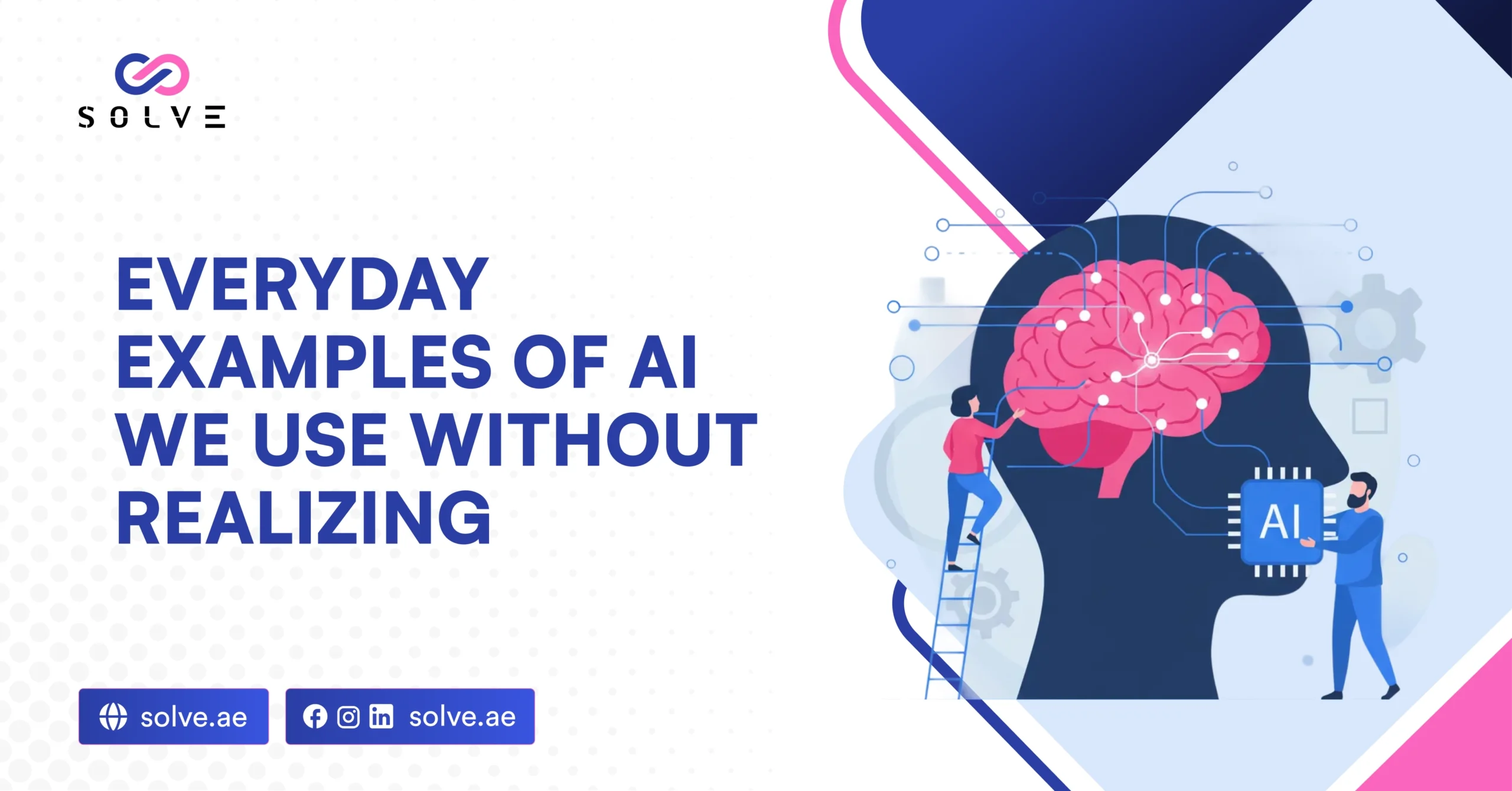- By Vanshika Choudhary
- November 18, 2025
Artificial Intelligence (AI) is not a thing of the future—it’s a daily part of our lives. AI is the one who keeps things going in the background from the instant we wake up to the instant we go to sleep after watching a show that was suggested to us. To a large extent, the public views AI as a robot or a machine of very high technology, but in reality, the situation is different—AI is everywhere in our apps, gadgets, and online tools, subtly assisting us in making wise decisions.
In the blog, we will discuss the most common and the most unnoticed-by-users examples of AI in daily life, so the reader can realize the extent to which AI has entered into communication, entertainment, shopping, travel, and even our fitness. All these AI applications make life not just faster and more convenient but also more personalized—thus confirming that AI is not the future; it is the present.
-
AI in Smartphones
Smartphones are the most common place where people encounter AI in their daily lives. Technology such as AI camera optimization, auto portrait mode, night mode photography, and facial recognition is all based on machine learning. When your smartphone automatically adjusts exposure, or during a call, it removes background noise. AI is there to enhance your experience with every tap.
AI also supports predictive text, grammar suggestions, and personalized app recommendations. Your smartphone accumulates information about your typing patterns, your daily routines, and the apps you use the most over time. The patterns created by AI in your phone make it easier for the phone to get smarter every day—that is precisely the reason your phone behaves like it “knows” you.
-
AI in Social Media
Artificial intelligence is a significant part of social media. AI is working every time you open Instagram, YouTube, TikTok, or Facebook; it’s the one that analyzes what you like, the duration of your viewing, and your interaction with others. As a result, social networks suggest content, which is solely based on your tastes, and it forms a very personalized feed that continuously attracts your attention.
Even filters, AR effects, and auto-tagging, which seem to be merely fun, are actually AI-driven technologies having facial recognition as one of their components. Not just this, AI also comes into play when it comes to identifying spam, filtering harmful content, and ensuring users’ safety. Just like that, these social media algorithms powered by AI do millions of predictions per second to serve you the most appropriate content.
-
AI in Online Shopping
The online shopping websites such as Amazon, Flipkart, and Myntra are very much AI-dependent. The “Recommended for You” feature is not random at all; it is rather a product of your browsing activities, past purchases, and time spent on different items. AI foresees what you are probably going to buy next, and as a result, the shopping experience becomes hassle-free.
AI is also in charge of the fluctuating pricing; thus, it makes sure that the product prices go up or down according to demand, seasonality, or your personal interests. Moreover, there are customer service bots that respond to your questions in a matter of seconds, which are also AI-based. They are the ones who monitor orders, handle returns, and troubleshoot around the clock without the need for a human operator.
-
AI in Entertainment
The entertainment providers use AI to suggest shows, films, and songs according to your taste. When Netflix highlights “because you watched…” or Spotify puts together playlists like Discover Weekly, it relies on AI to precisely interpret your viewing and listening habits.
AI in gaming also entails the designing of opponents that are realistic, changing levels of difficulty, and interactive storylines that transform according to your choices. These attributes make the whole experience of entertainment more personal, but surely, it is no less enjoyable and interactive—thanks to AI.
-
AI in Navigation & Travel
Google Maps is hailed as one of the top live AI applications. It forecasts the traffic situations, gives the shortest path, and informs you about accidents or changes—all instantaneously. Deploying millions of data points each minute, AI promises your travel to be quick and efficient.
On-demand transport apps like Uber and Ola make use of AI for fare determination, route finding, driver matching, and ETA prediction. Besides, travel apps are already using AI for flight price forecasting and suggesting the best time for ticket purchase. Check out ouyr latest blog post on What Is Artificial Intelligence? A Simple Guide for Beginners
-
AI in Finance & Banking
AI is being employed in Banks and finance apps almost every day to keep the process secure and efficient. When your bank notices a transaction that raises a flag, it’s Artificial Intelligence that is assessing your spending pattern and picking the odd one out. The AI-based fraud detection system is so well that it saves the day for millions of users every day.
In the same manner, AI also plays a role in scoring credit, giving out loans, and coming up with investment recommendations. Mobile banking apps entail automatically classifying transactions, providing bill alerts, and facilitating budget management—thereby making money management not only simple but also smart.
-
AI in Smart Home Devices
Artificial Intelligence is the main factor that smart home devices depend on most for providing customized services. Voice assistants like Alexa and Google Home, for their part, are capable of understanding your verbal directions, playing your favorite music, managing your electric gadgets, and providing information—all through natural communication.
Home surveillance camera systems that operate with the use of AI technology can tell whether there is a person there or not, identify the person, and in a second inform you of the presence of a stranger. Likewise, smart TVs and ACs get to know what you like so that your house can be more responsive, automated, and comfortable.
-
AI in Healthcare & Fitness
Fitness apps and smartwatches are already utilizing artificial intelligence to interpret the user’s heart rate, quality of sleep, number of burned calories, and daily activity levels. These data are valuable for lifestyle changes and making health goals easier to monitor. A few devices are even able to identify irregular heart rhythms and alert the user right away.
Next, there are AI-driven symptom checkers and health applications that perform preliminary diagnoses by looking into the user’s inputs. Although they do not take the place of doctors, such tools assist people in understanding the symptoms and being able to make wise decisions about their health.
In short
Artificial Intelligence has become omnipresent in our lives, but very often it is so well integrated that we aren’t even aware of it. The dependency of the world on intelligent systems has been illustrated to a great extent through the examples of AI in daily activities such as smartphones, social media, banking, shopping, and travel. Contact us as AI turns our routines into simpler, faster, and ever more personal ones, but the process still remains unnoticed because it does not require any of our attention.




